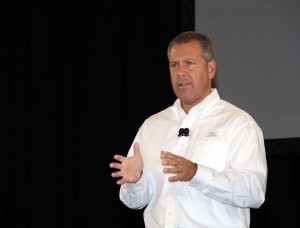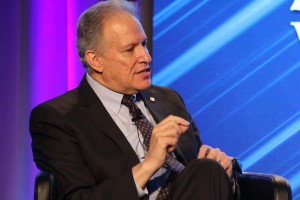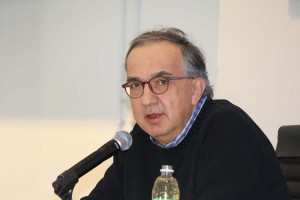The National Highway Traffic Safety Administration and the U.S. Department of Commerce plan to make a series of “potentially history-making” announcements this week and then later in January, NHTSA Administrator Mark Rosekind announced during a visit to Detroit.
One of the three developments in the works would bring together all too frequently confrontational regulators and industry leaders as part of a new safety consortium. The goal, according to several of those set to join the group, would be to bring new safety technology and processes to market faster, often years sooner than would be possible through the normal regulatory process.
“These actions going forward (will) change the nature of the auto industry,” said Mark Rosekind, the head of the National Highway Traffic Safety Administration.
The proposed consortium is expected to bring together NHTSA and 16 different domestic and foreign automakers, including General Motors, Ford, Fiat Chrysler, Daimler, BMW, Toyota, Nissan, Honda and Hyundai.
While Rosekind wouldn’t go into details ahead of a planned Friday announcement, the consortium is believed to be modeled after something done in his previous job as head of the National Transportation Safety Board. During his tenure, he got airline manufacturers such as Boeing and Airbus to agree to share safety technologies and processes rather than hold them as proprietary.
Not only might it see manufacturers share breakthroughs, but Rosekind is clearly pushing to get the industry thinking about making change faster than would be possible through the cumbersome regulatory process.
“We need to get to the stage where safety is no longer a competitive tool,” but something all manufacturers are expected to deliver, Fiat Chrysler CEO Sergio Marchionne during a media roundtable at the Detroit Auto Show on Monday.
While the final details are “still being finessed,” Ford President of the Americas Joe Hinrichs said he is upbeat about the prospects, adding that, “a true spirit of cooperation between the agency and the industry is in the best interest of consumers.”
An example of what the consortium could eventually do might be demonstrated by another announcement set to come this month. Last September, a group of 10 automakers jointly agreed to make automatic emergency braking systems standard on all their future vehicles.
An advanced version of forward collision warning, the auto-braking technology has already been shown to help reduce the number of highway accidents, as well as injuries and fatalities. Such systems are widely available on high-line products, but would become commonplace on even base models under the plan that Rosekind said he hopes to announce later this month.
More importantly, he added during a visit to Detroit, the plan would get AEB into wide production at least several years ahead of what would happen if NHTSA set out to mandate the technology. And that, said Rosekind, translates into more lives saved.
(Automakers, U.S. regulators set to announce agreement on improved safety. For more, Click Here.)

Ford's Joe Hinrichs is on board with the new consortium of automakers trying to implement new safety standards.
Yet another major announcement is scheduled to come on Thursday, when Secretary of Transportation Anthony Foxx will visit the North American International Auto Show. He is planning to take steps to eliminate barriers that are holding up the development of autonomous vehicles.
Rosekind and NHTSA believe that advanced safety systems and, eventually, self-driving vehicles, are essential in reaching the agencies goal of reaching a point where the nation experiences no traffic fatalities, down from more than 32,000 in 2014, the last year for which full data is available.
That’s not just a target set by wide-eyed regulators. In its Vision 2020 plan, Volvo has set a goal of having “no fatalities or critical injuries in our cars” produced after the 2020 model-year, said CEO Hakan Samuelsson, during an auto show news conference on Monday. Nissan has set a similar target.
(To see more about the effort to toughen the standards for crash test ratings, Click Here.)
Fifty years after the publication of the groundbreaking Ralph Nader book, “Unsafe at Any Speed,” the auto industry no longer believes that “safety doesn’t sell.” And there’s growing consent that it must be one of the industry’s top priorities, not just the worry of consumers and regulators.
“I agree with that shift,” said Fiat Chrysler CEO Marchionne.
One question raised about the new consortium Rosekind plans to announce is whether the industry participants might try to bluster NHTSA into backing off on some safety issues. Rosekind stressed that his agency isn’t about to back off of rulemaking. Indeed, it may need to press hard to get automakers not part of the consortium to act on their own.
(End of the road: 20 models headed for the scrapheap. For more, Click Here.)
He also noted that Congress, as part of the new federal transportation bill, has tripled the potential fine that NHTSA can levy against automakers who violate safety rules to $105 million. But he doesn’t plan to use that “big stick” too often, Rosekind saying, “the best thing is not having to use it.”



I have some “news” for NHTSA… there will not be a time in history in the next century when there are zero fatalities. These people just don’t get it that AV’s can not prevent all accidents. What do these people think is going to happen when AV computer’s crash or AVs get hacked, because they will.